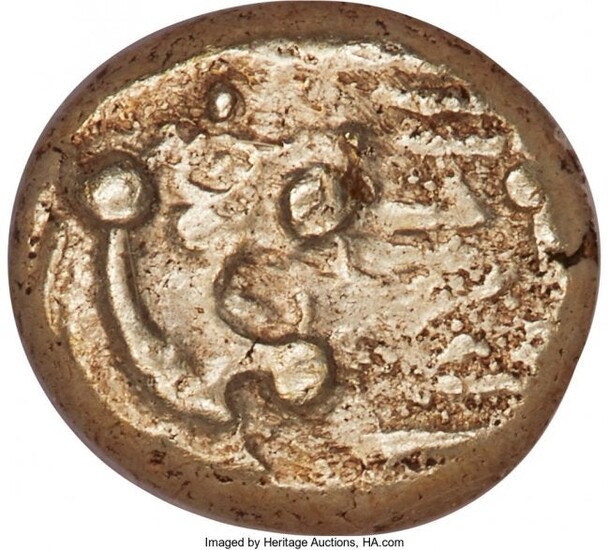30022: LYDIAN KINGDOM. Time of Ardys-Alyattes (ca. 630s
LYDIAN KINGDOM. Time of Ardys-Alyattes (ca. 630s-560 BC). Kukalim(?). EL sixth-stater or hecte (10mm, 2.35 gm). NGC AU 4/5 - 5/5. Sardes. KUKALI (Lydian, retrograde), legend between confronting heads of roaring female lions (only the one facing right visible) / Two incuse squares of different size, side-by-side, with irregular decorated interior surfaces. Weidauer Group XVIII, 114-5. Cf. Triton XV, lot 1241 (trite). Extremely rare. Ex Numismatik Naumann, Auction 62 (4 February 2018), lot 300 This extremely rare electrum hecte bears the inscription KUKALIM in Lydian script, but exactly what this legend means, or who it represents, is as yet a mystery. Seemingly contemporary (but far more common) hectes and trites are inscribed WALWET; transliterated to Greek, this is rendered as "of Alyattes," an early king of Lydia circa 610-560 BC. With a similar transliteration, KUKALIM can be rendered as "of Gyges," and a king of that name is known to have reigned in Lydia, by varying estimations, either circa 716-678 BC or 680-644 BC. In fact Gyges founded the Mermnad Dynasty, to which the later Alyattes and Croesus belonged. This Gyges is also believed to have inspired the Biblical King Gog mentioned in Ezekial and Revelation. Tempting as it is to assign the KUKALIM coins to him, scholars have demonstrated that they cannot have been struck that early, and in fact die links with the reverse punches show that they were struck contemporaneously with those of Alyattes. The most likely possibility is that the Gyges mentioned on the coin is a later member of the Mermnad Dynasty who was named after the founder, who either reigned jointly with Alyattes or as governor of a Lydian province. HID03101062020 © 2020 Heritage Auctions | All Rights Reserved
[ translate ]View it on
Estimate
Time, Location
Auction House
LYDIAN KINGDOM. Time of Ardys-Alyattes (ca. 630s-560 BC). Kukalim(?). EL sixth-stater or hecte (10mm, 2.35 gm). NGC AU 4/5 - 5/5. Sardes. KUKALI (Lydian, retrograde), legend between confronting heads of roaring female lions (only the one facing right visible) / Two incuse squares of different size, side-by-side, with irregular decorated interior surfaces. Weidauer Group XVIII, 114-5. Cf. Triton XV, lot 1241 (trite). Extremely rare. Ex Numismatik Naumann, Auction 62 (4 February 2018), lot 300 This extremely rare electrum hecte bears the inscription KUKALIM in Lydian script, but exactly what this legend means, or who it represents, is as yet a mystery. Seemingly contemporary (but far more common) hectes and trites are inscribed WALWET; transliterated to Greek, this is rendered as "of Alyattes," an early king of Lydia circa 610-560 BC. With a similar transliteration, KUKALIM can be rendered as "of Gyges," and a king of that name is known to have reigned in Lydia, by varying estimations, either circa 716-678 BC or 680-644 BC. In fact Gyges founded the Mermnad Dynasty, to which the later Alyattes and Croesus belonged. This Gyges is also believed to have inspired the Biblical King Gog mentioned in Ezekial and Revelation. Tempting as it is to assign the KUKALIM coins to him, scholars have demonstrated that they cannot have been struck that early, and in fact die links with the reverse punches show that they were struck contemporaneously with those of Alyattes. The most likely possibility is that the Gyges mentioned on the coin is a later member of the Mermnad Dynasty who was named after the founder, who either reigned jointly with Alyattes or as governor of a Lydian province. HID03101062020 © 2020 Heritage Auctions | All Rights Reserved
[ translate ]


